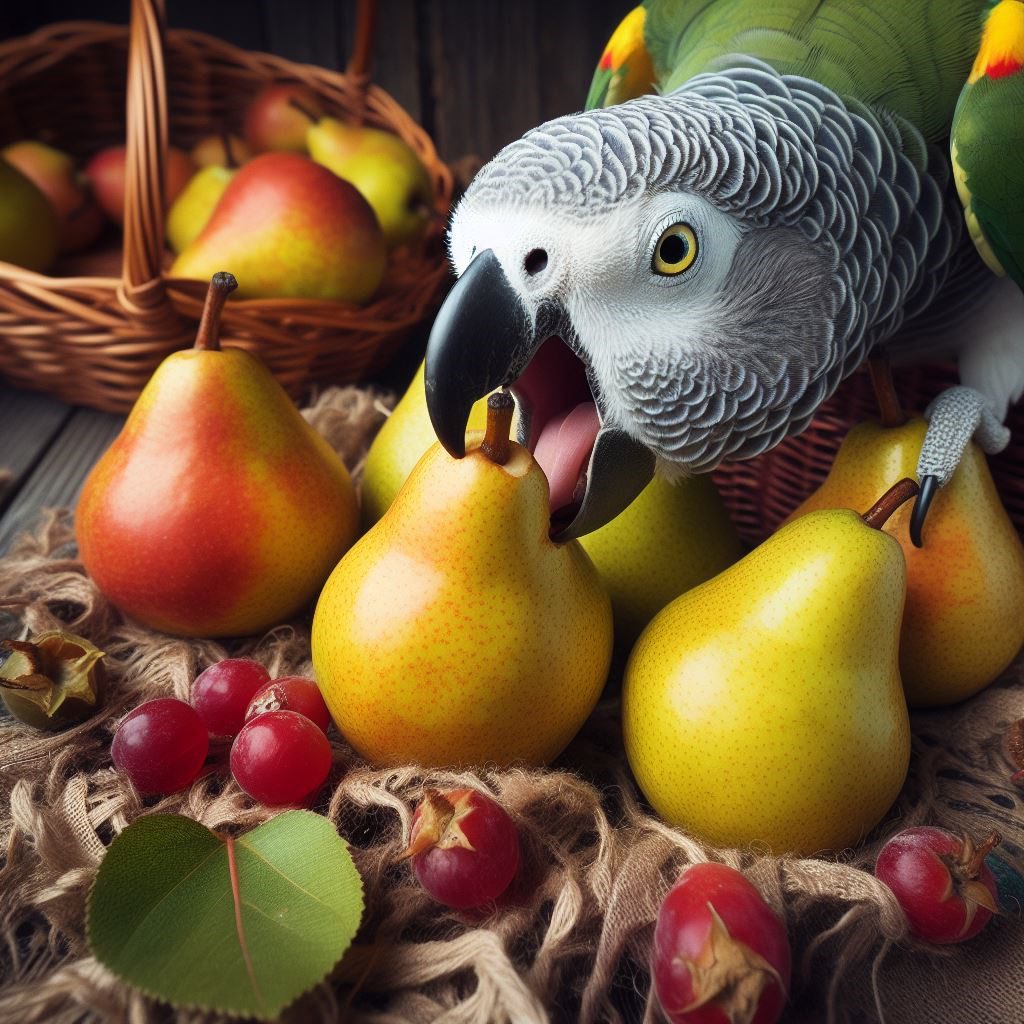Pears are one of my favorite fruits, the juices dripping down my chin on a hot summer’s day make them all that more appealing. They provide a sweet flavor that parrots love and would often eat in the wild. However, like a lot of fruits, there are multiple different kinds with different tastes and textures. Some examples are Asian pears, European pears, and anjou pears. But are they safe for our parrots to eat? Let’s find out.

Can parrots eat pears? Yes, parrots can eat pears they are extremely nutritious and safe for them to have. Pears contain a great source of fiber, vitamin C, vitamin K, potassium, and copper. There are also many health benefits that your parrot can receive from adding pears to their diet. However, it’s important to feed them in moderation as pears are a fruit with one of the highest natural sugar content.
In this article, I’ll explain the benefits of pears in more detail, whether can they eat the core, and some other things you should know as a parrot parent.
Pear Benefits For Parrots
We know pears are good for our Parrots, but just how good are they? Let’s take a closer look at the nutritional content.
A medium-sized pear (100 grams) contains the following :
| Calories | 57 |
| Protein | 0.4g |
| Carbs | 15g |
| Sugar | 10g |
| Fiber | 3.1g |
A Great Source Of Fiber
A small to medium pear contains around 3g of fiber, a nutrient that can lower your parrot’s cholesterol and help regulate blood sugar levels. Fiber is more commonly known for its benefits to the digestive system.
- Better gut health protects against certain cancers
- Healthier bowel movements
- May help your parrot live longer
- Helps with weight control
Broccoli, berries, apples, dried fruits, and nuts are all great sources of fiber if you need some alternatives to pears.
Vitamin C
Pears contain some vitamin C, a vitamin essential for helping your parrot’s immune system fight off disease and illness.
There are also a number of other impressive health benefits vitamin C provides :
- Protects the eyes from cataracts
- Lowers blood pressure
- Helps the cardiovascular system by cleaning plaque from blood vessels
- Anti-inflammatory
- Regulates blood sugar
Now you know just some of the things vitamin C can do for your parrot it’s important they get enough in their diet. Kiwi, strawberries, guava, broccoli, cantaloupe, and potatoes can also provide your parrot with that much-needed vitamin C.
Vitamin K
If your parrot is unfortunate enough to get a cut that bleeds, vitamin K is what helps it heal and stops it from bleeding excessively. Vitamin K is responsible for blood clotting due to prothrombin being produced which is a protein and clotting factor in bone metabolism and clotting factors.
Without enough vitamin K in your bird’s diet, they might bleed more than they need to if they get a cut.
All leafy greens like kale, spinach, broccoli, and Brussels sprouts contain vitamin K along with pears.
Potassium
Pears also include potassium, a mineral that helps to lower blood pressure and water retention. It is most recognized for assisting your parrot with muscle contractions, fluid balance, and the way their nerves send and receive messages.
Potassium has also been related to a better cardiovascular system.
Foods that are high in potassium include :
- Bananas
- Spinach
- Broccoli
- Lentils
- Squash
- Dates
- Cantaloupe
Copper
Copper is important for helping the body form collagen, which is important for keeping your parrot’s skin healthy.
Other advantages of copper include :
- Helps the body absorb iron to create red blood cells
- Improved energy
- Better cardiovascular health
- Stronger immune system
If your parrot is deficient in copper their bones may be weaker, they might be fatigued often and they have a higher chance of becoming sick.
How You Should Feed Pears To Your Parrot
Before anything you should wash your pears as there is a chance they will contain pesticides or some leftover dirt from them being harvested.
It’s important you don’t cook pears before feeding them to your parrot as during the cooking process even more sugar will be produced and pears already have a high enough sugar content without this. Parrots will prefer them better raw and it’s better nutritionally to feed them raw pears anyway.
The skin of pears is also edible and actually contains some antioxidants they can benefit from but if your parrot doesn’t like it then no harm you can just peel it off.
Place the peeled pears on a chopping board that has been cleaned.
Using a sharp, clean knife, cut each pear in half lengthwise.
To scoop out the core, place a melon baller on top of it and push it into it.
Toss out the core.
With the knife, remove any brown spots or areas that are too soft.
Depending on your parrot’s size, cut the pear halves into quarters or smaller slices if you have a smaller bird.
Are There Any Risks To Feeding Your Parrot?
There are 10 grams of sugar in just one small to medium-sized pear, this is why pears are a fruit with one of the highest natural sugar content.
What this means for your parrot is pears shouldn’t be fed too often remember moderation is important. I’d recommend no more than two times a week and you should be strict with your portion control.
Too much sugar in parrots can lead to obesity and a whole array of health problems for them, similar to us humans.
What Other Foods Can Your Parrot Eat?
You know pears are safe for your Parrot to eat but if you’re like me then you’re always looking for new foods to improve your Parrot diet to create some variety and and include vital things that aren’t already in your bird’s diet.
So what other foods can your Parrot eat?
- Fruit & Vegetables
Foods like asparagus, broccoli, carrots, peppers, bananas, blueberries, and pineapples are all fine and encouraged for your Parrot to eat.
- Nuts
Things like almonds, Brazil nuts, cashews, hazelnuts, pistachios, and walnuts can be fed to your parrot. Just be wary of the fat content in some of them so they may need to be treated as a snack for your Parrot. We don’t want them getting fat!
Pears For Parrots – Final Thoughts
Pears make a delicious safe snack for your parrot as they contain no toxins that will harm your pet, along with having an impressive list of health benefits. However, they are very high in sugar and should only be fed around two times per week to limit any health problems. Fruits and vegetables should only make up around 15-30% of your parrot’s total diet depending on the species.
I hope you have found this article useful and your parrot enjoys a tasty new snack!






